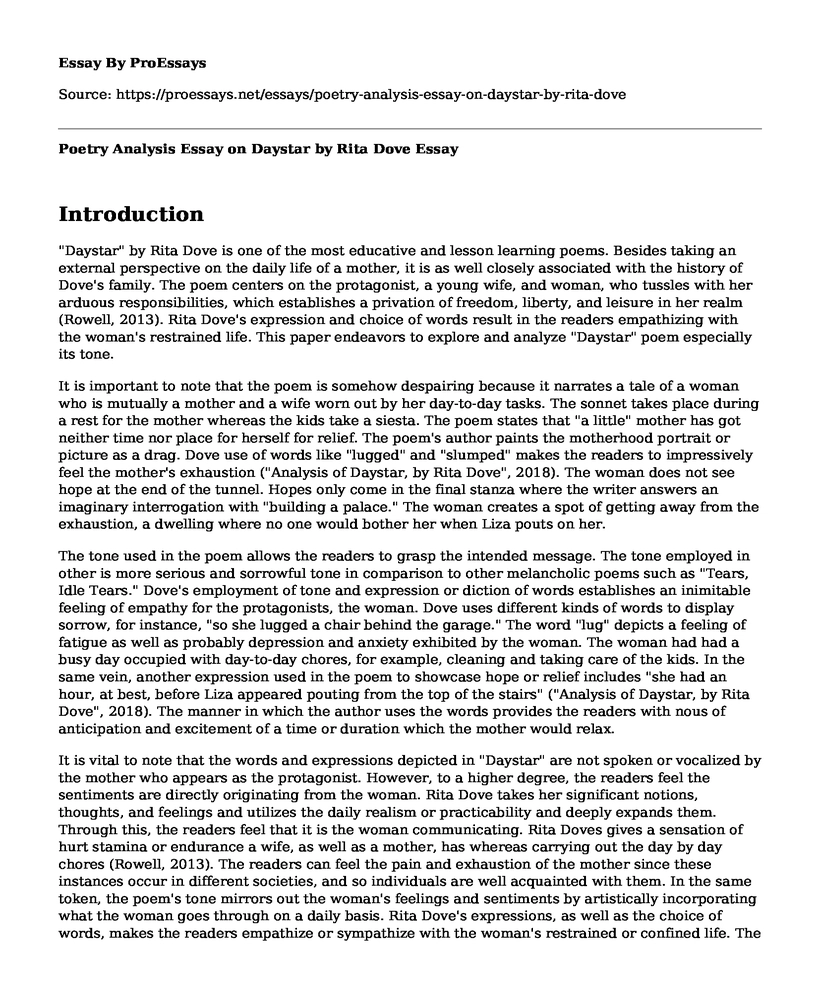Introduction
"Daystar" by Rita Dove is one of the most educative and lesson learning poems. Besides taking an external perspective on the daily life of a mother, it is as well closely associated with the history of Dove's family. The poem centers on the protagonist, a young wife, and woman, who tussles with her arduous responsibilities, which establishes a privation of freedom, liberty, and leisure in her realm (Rowell, 2013). Rita Dove's expression and choice of words result in the readers empathizing with the woman's restrained life. This paper endeavors to explore and analyze "Daystar" poem especially its tone.
It is important to note that the poem is somehow despairing because it narrates a tale of a woman who is mutually a mother and a wife worn out by her day-to-day tasks. The sonnet takes place during a rest for the mother whereas the kids take a siesta. The poem states that "a little" mother has got neither time nor place for herself for relief. The poem's author paints the motherhood portrait or picture as a drag. Dove use of words like "lugged" and "slumped" makes the readers to impressively feel the mother's exhaustion ("Analysis of Daystar, by Rita Dove", 2018). The woman does not see hope at the end of the tunnel. Hopes only come in the final stanza where the writer answers an imaginary interrogation with "building a palace." The woman creates a spot of getting away from the exhaustion, a dwelling where no one would bother her when Liza pouts on her.
The tone used in the poem allows the readers to grasp the intended message. The tone employed in other is more serious and sorrowful tone in comparison to other melancholic poems such as "Tears, Idle Tears." Dove's employment of tone and expression or diction of words establishes an inimitable feeling of empathy for the protagonists, the woman. Dove uses different kinds of words to display sorrow, for instance, "so she lugged a chair behind the garage." The word "lug" depicts a feeling of fatigue as well as probably depression and anxiety exhibited by the woman. The woman had had a busy day occupied with day-to-day chores, for example, cleaning and taking care of the kids. In the same vein, another expression used in the poem to showcase hope or relief includes "she had an hour, at best, before Liza appeared pouting from the top of the stairs" ("Analysis of Daystar, by Rita Dove", 2018). The manner in which the author uses the words provides the readers with nous of anticipation and excitement of a time or duration which the mother would relax.
It is vital to note that the words and expressions depicted in "Daystar" are not spoken or vocalized by the mother who appears as the protagonist. However, to a higher degree, the readers feel the sentiments are directly originating from the woman. Rita Dove takes her significant notions, thoughts, and feelings and utilizes the daily realism or practicability and deeply expands them. Through this, the readers feel that it is the woman communicating. Rita Doves gives a sensation of hurt stamina or endurance a wife, as well as a mother, has whereas carrying out the day by day chores (Rowell, 2013). The readers can feel the pain and exhaustion of the mother since these instances occur in different societies, and so individuals are well acquainted with them. In the same token, the poem's tone mirrors out the woman's feelings and sentiments by artistically incorporating what the woman goes through on a daily basis. Rita Dove's expressions, as well as the choice of words, makes the readers empathize or sympathize with the woman's restrained or confined life. The expressions and word choice make the readers feel that it is the woman speaking (Rowell, 2013). Additionally, they make the readers see the true picture of the woman, for example, how she carries out to tend the daily activities.
Conclusion
In conclusion, it clear Dove Rita tend divulge that women are overworked and unappreciated. The character in this scenario consistently gives to everybody surrounding her and takes very diminutive time for herself just like the many mothers across the globe. Dove Rita's poem expressively catches readers, eyes through linking the emotions of the character in the poem. The poem displays a motherhood which is usually not seen by numerous persons; which is a dreary, dull, and monotonous existence. People can significantly feel the woman's fatigue or exhaustion. The poem shows that mothers will never neglect their respective children in spite of undergoing difficult and tough situations or circumstances. It is my sincere belief that this poem transcends the duties and roles of motherhood. It touches everyone who faces the modern life struggles such as stress brought as a result of limited resources leading to poor living standards among many people. It is important to acknowledge that wider range of audience can associate this poem with real life since many feel the same way.
References
Analysis of Daystar, by Rita Dove. (2018). Retrieved from https://jshields3.wordpress.com/2014/04/14/analysis-of-daystar-by-rita-dove/
Rowell, C. H. (Ed.). (2013). Angles of ascent: a Norton anthology of contemporary African American poetry (pp. xxix-liii). WW Norton & Company.
Cite this page
Poetry Analysis Essay on Daystar by Rita Dove. (2022, Jun 04). Retrieved from https://proessays.net/essays/poetry-analysis-essay-on-daystar-by-rita-dove
If you are the original author of this essay and no longer wish to have it published on the ProEssays website, please click below to request its removal:
- Darkness Visible by Styron - Book Review Example
- American Civil War in William Faulkner's A Rose for Emily
- Self Versus Collective Interest in British Politics as Portrayed in the Lord of Flies Essay
- Kollontai's 'Sisters' - Literature Analysis Essay
- Paulo Coelho: A Modern Writer With a Vast Bibliography - Research Paper
- Essay Example on Comparing Wordsworth and Sidney: Sleep Poems
- Mary Shelley's Frankenstein: A Gothic Exploration of Artificial Life - Essay Sample







